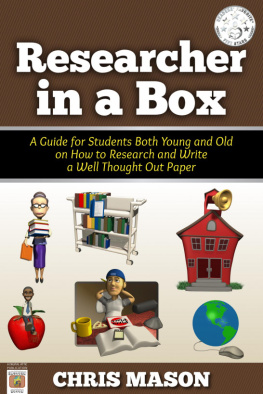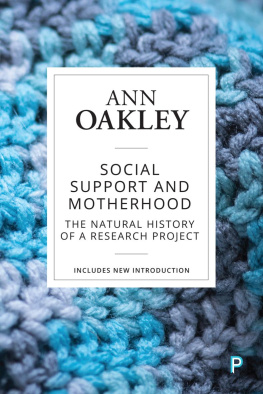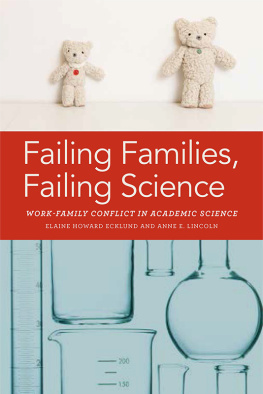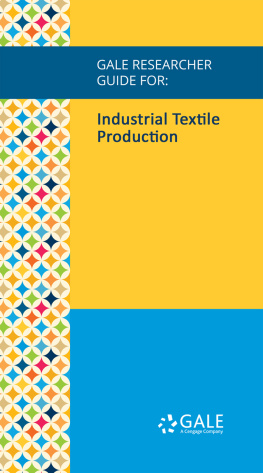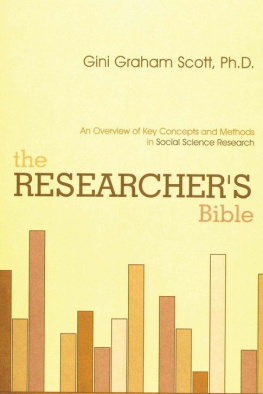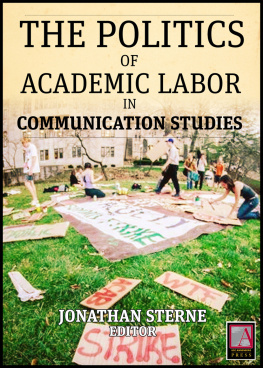The Inner World of Research
The Inner World of Research
On Academic Labor
Stefan Svallfors
Anthem Press
An imprint of Wimbledon Publishing Company
www.anthempress.com
This edition first published in UK and USA 2020
by ANTHEM PRESS
7576 Blackfriars Road, London SE1 8HA, UK
or PO Box 9779, London SW19 7ZG, UK
and
244 Madison Ave #116, New York, NY 10016, USA
Copyright Stefan Svallfors 2020
The author asserts the moral right to be identified as the author of this work.
All rights reserved. Without limiting the rights under copyright reserved above, no part of this publication may be reproduced, stored or introduced into a retrieval system, or transmitted, in any form or by any means (electronic, mechanical, photocopying, recording or otherwise), without the prior written permission of both the copyright owner and the above publisher of this book.
British Library Cataloguing-in-Publication Data
A catalogue record for this book is available from the British Library.
Library of Congress Cataloging-in-Publication Data
Library of Congress Control Number: 2019955632
ISBN-13: 978-1-78527-301-8 (Hbk)
ISBN-10: 1-78527-301-9 (Hbk)
This title is also available as an e-book.
He was never afraid when writing, but only then.
Per Olov Enquist, Liknelseboken [The Book of Parables] (Stockholm: Norstedts, 2013)
I have seen things you people wouldnt believe. Attack ships on fire off the shoulder of Orion. I watched C-beams glitter in the dark near the Tannhauser Gate. All those moments will be lost in time, like tears in rain.
The replicant Roy Battys monologue from the film Blade Runner (1982)
To fall is to understand the universe.
Sara Stridsberg, Beckomberga: ode till min familj (Stockholm, Albert Bonniers frlag, 2014), p. 354. Extract from The Gravity of Love translated by Deborah Bragan-Turner
Contents
Writing this book has been a solitary exercise, based largely as it is on my own experiences and memories. Nevertheless, there are many people who have contributed to it, nay, made it possible.
Gunilla Gerland, Olle Hggstrm, Mattias Marklund, Lars Nyberg, Bo Rothstein, Chris Reus-Smit and Joel Sundin accepted to be interviewed for the book and provided many insights into their worlds of thoughts and experiences. The same goes for the interviewees who preferred to remain anonymous.
Joa Bergold, Erica Falkenstrm, Janne Flyghed, Gunilla Gerland, Anne Grnlund, Olle Hggstrm, Tomas Lappalainen, Christer Nordlund, Bo Rothstein, Hugo Svallfors and Signe Svallfors provided essential feedback on previous Swedish versions of the text. Their comments stretched from the positively enthusiastic to the courageously destructive. The result is a much better book than I could ever have achieved myself.
Jens Beckert and Monika Kostera encouraged me to publish the text in English and have been helpful in navigating publishing houses.
Neil Betteridge translated the text with flavour and elegance. It was truly miraculous to see my text transformed into a different language without any effort on my part.
Erica, for making everything possible. She is a singular person who has chosen to share her singularity with me.
An old legend tells of how Chartres cathedral was struck by lightning and burned to the ground. People flocked in their thousands from different directions like a vast procession of lemmings from all four corners of the world. All kinds of people came and together they rebuilt the cathedral on the old foundations. They lived their lives by the enormous edifice until it was complete master builders, labourers, artists, jesters, nobles, prelates and citizens but they remain anonymous; to this day, no one knows the names of those who built the cathedral of Chartres.
[] So if someone asks me what I would like the purpose of my films to be I could reply: I want to be one of the artists in the cathedral on the great plain. I want to sculpt from the stone a dragons head, an angel or a devil, or perhaps a saint, it matters not which; I derive such satisfaction from all manner of things. No matter if Im a believer or not, no matter if Im a Christian or a heathen, I help to build the cathedral because Ive learnt to form faces, limbs and bodies from stone.
I also want to help build the cathedral on the great plain. I want to use my abilities because I have them, because I am good at what I do and because it gives me a deep sense of satisfaction. I never think of citation index or impact factor when I solve research problems or translate nebulous thoughts into coherent text. What I think of is how the dragons head can emerge from the stone.
These qualities my professional aptitude and professional pride I want to safeguard. Cultivate, exercise, talk about. I want to shield them from the malice that can blight academia, malice by which people impede and oppress each other. Destroy each others potential. I also want to shield them from those who seek to turn us into pawns in the knowledge war, fought in order that our research nation may triumph (over whom and why is unknown).
It is not my intention to make my own lifestyle somehow prescriptive. Maybe you, dear reader, wish to live a completely different life to the one I have done and found blessed. But nor do I want my professional experiences of joy and suffering, of euphoria and despair to melt away like tears in the rain.
Hence this book.
This book has its origins in some of my burgeoning frustrations. The first concerns how we university scholars do not teach about the realities of research. Perhaps it is unteachable, but we should at least talk about what we do and how it feels. Such conversations are not had other than in passing with individual colleagues. Nor are we capable of telling those who finance and try to control our research what we do and what we need to do it well.
The second is about the relationship between body, emotion and knowledge. The intellectual life is regarded alarmingly often as a non-physical, emotionless activity as if our thoughts and our knowledge were disengaged from our bodies and their needs, desires and limitations. I believe that this view gives rise to a narrow, too regulated, emotionally amputated way of approaching the objects of our knowledge. And that this inhibits our creativity as researchers and as human beings.
My third frustration is about how the inter-human relations in which knowledge production is embedded are so rarely given the recognition they deserve. The solitary researcher the genius in his chamber is often pitted against vast collaborative environments in which hundreds of researchers work on gigantic projects. But it is neither the lone scientist nor the huge centres that are the most relevant level of knowledge generation. This particular honour is reserved for the group, the team, and its cognitive, emotional and social relations. A mini-collective, a micro-cosmos that is virtually invisible when its research is presented, debated and financed.
My final and perhaps greatest frustration concerns just this: research financing and research policy. One often forms the impression that politicians and civil servants think that good research can be administrated by decree. As if the researchers were pliant soldiers in a knowledge war. Assembling creative and productive research environments is in fact a delicate and emotional enterprise. It is about building (literally and figuratively) spaces in which people feel secure and remember all they know where they have the courage to share their agonies and their joys.




